Onze kleindochter kwam met een keizersnede ter wereld. Via de natuurlijke weg was onmogelijk, de placenta zat voor de uitgang. Mooi dat dan een geboorte via een keizersnede kan.

Onze kleindochter kwam met een keizersnede ter wereld. Via de natuurlijke weg was onmogelijk, de placenta zat voor de uitgang. Mooi dat dan een geboorte via een keizersnede kan. Een paar weken later kwam er een cursus vanuit de Natura foundation, “HET DARMMICROBIOOM EN IMMUUNSYSTEEM VAN BABY’S: DE INVLOED VAN DE GEBOORTE” met name de keizersnede. Aangezien onze kleindochter het toch wel zwaar had, heb ik mij aangemeld voor deze cursus. Ik heb het een en ander samengevat, wellicht herkend je het een en ander bij je eigen kind. Foto zijn afkomstig van Natura Foundation.
Deze cursus werd gegeven door
Fien Demeulemeester
Sportwetenschapper (Universiteit Gen)
Osteopaat (international academy of osteopathy)
Orthomoleculair therapeut (Natura Foundation)
KPN-therapeut (Natura Foundation)
Medewerker RGD (Natura Foundation)
Coach gymnastiek.
Het was een zeer interessante maar vooral leerzame cursus. Echter wist ik niet dat zo een keizersnede zoveel invloed kan hebben op het immuunsysteem en de gezondheid van de baby ook op latere leeftijd. Maar niet verwonderlijk, eigenlijk heel logisch, niks boven natuurlijk bevallen. Ik denk dat vele a.s ouders deze informatie ook missen en ook niet mee krijgen vanuit de reguliere wereld. Voorop staat dat een Keizersnede levens redt, dat mogen we niet uit het oog verliezen. Echter gaat er niets boven een natuurlijke bevalling en wanneer dit mogelijk is, altijd doen! Waarom?
5 Redenen waarom stress bij een natuurlijke geboorte belangrijk is.
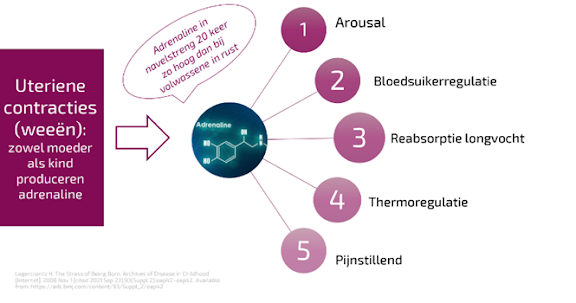
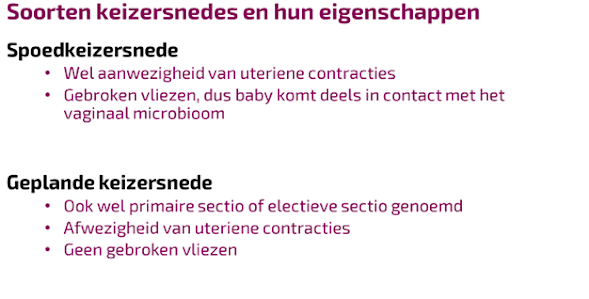
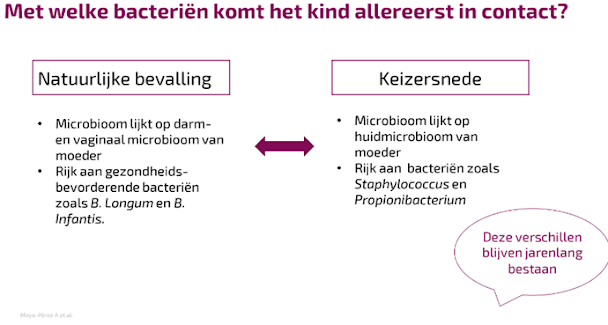
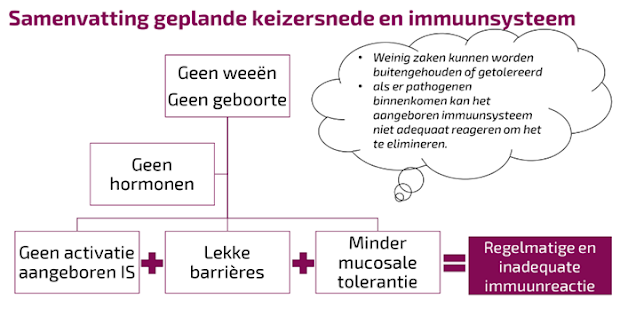
Korts samengevat
Anders dan met de natuurlijke geboorte is er bij een keizersneden o.a. geen hormonale piek en pijn stress wat zeker heel belangrijk is. Ook komt de baby met de huidbacterie in aanraking en niet met de schede bacterie die juist belangrijk zijn voor de darmfuncties verloop van de gezondheid/immuunsysteem van de baby. Dit geeft dus mogelijke gezondheidsklachten in pril begin maar ook op latere leeftijd. Positief is, deze is wel te beïnvloeden door suppletie en borstvoeding. Naast probiotica is er ook prebiotica nodig. Prebiotica betekend heel veel voor de gezondheid en kan direct na de geboorte mee gestart worden.
Borstvoeding blijkt dus ook zeer belangrijk te zijn om hier direct na de geboorte mee te starten. Kennelijk schiet de nodige voorlichting en informatie hierover naar de ouders toe door gynaecoloog/verpleegkundige/verloskundig te kort. Men kan zich afvragen of zij deze kennis bemachtigen over de mogelijke gevolgen van gezondheid van een keizersnede bij de baby.
De mogelijke gezondheid gevolgen kunnen zijn;

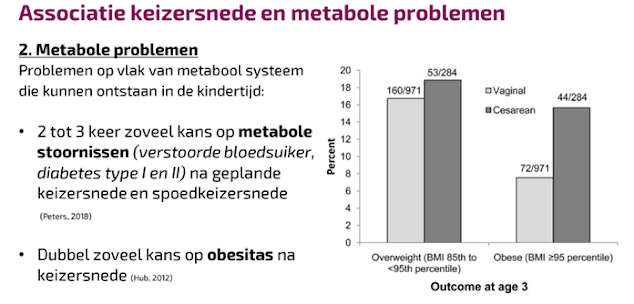
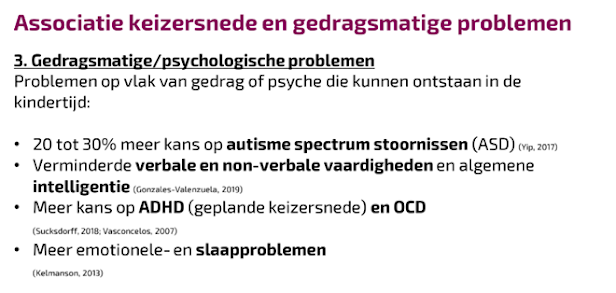
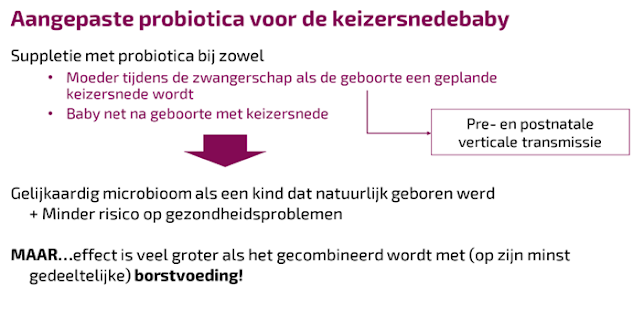
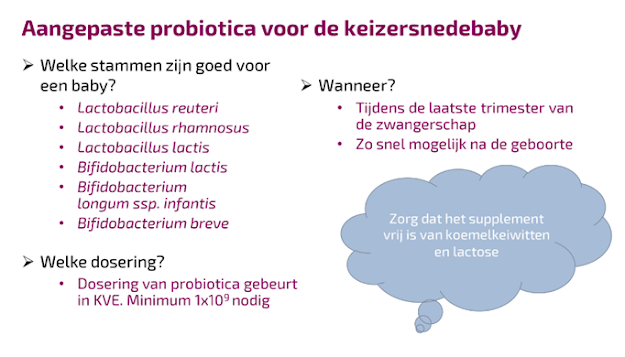
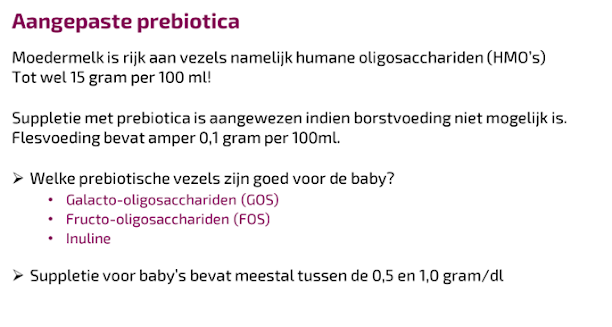
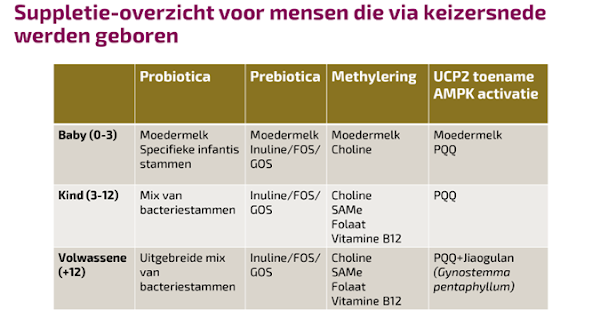
Heb je nog vragen na aanleiding van deze informatie?
Neem dan contact op met de klantenservice van Natura Foundation, zij staan voor je klaar.
Telefonisch via 0186 577 177 per e-mail.
Bronnen
- Aslan, Yakup, Şebnem Kader, Mehmet Mutlu, Mehmet Sarıaydın, Turhan Aran, Ahmet Alver, en Cemil Kahraman. ‘The Effect of Delivery Type on Uncoupling Protein-2 Levels’. The Journal of Maternal-Fetal & Neonatal Medicine 29, nr.
18 (16 september 2016): 2940–43. https://doi.org/10.3109/14767058.2015.1109619.
- Bager, P., J. Wohlfahrt, en T. Westergaard. ‘Caesarean Delivery and Risk of Atopy and Allergic Disesase: Meta-Analyses’. Clinical & Experimental Allergy 38, nr. 4 (april 2008): 634–42. https://doi.org/10.1111/j.1365-2222.2008.02939.x.
- Bekdash, Rola A. ‘Neuroprotective Effects of Choline and Other Methyl Donors’. Nutrients 11, nr. 12 (6 december 2019): 2995. https://doi.org/10.3390/nu11122995.
- Cardwell, C. R., L. C. Stene, G. Joner, O. Cinek, J. Svensson, M. J. Goldacre, R. C. Parslow, e.a. ‘Caesarean Section Is Associated with an Increased Risk of Childhood-Onset Type 1 Diabetes Mellitus: A Meta-Analysis of Observational
Studies’. Diabetologia 51, nr. 5 (mei 2008): 726–35. https://doi.org/10.1007/s00125-008-0941-z.
- Dahlen, H.G., H.P. Kennedy, C.M. Anderson, A.F. Bell, A. Clark, M. Foureur, J.E. Ohm, e.a. ‘The EPIIC Hypothesis: Intrapartum Effects on the Neonatal Epigenome and Consequent Health Outcomes’. Medical Hypotheses 80, nr. 5 (mei
2013): 656–62. https://doi.org/10.1016/j.mehy.2013.01.017.
- Darabi, Behzad, Shoboo Rahmati, Mohammad Reza HafeziAhmadi, Gholamreza Badfar, en Milad Azami. ‘The Association between Caesarean Section and Childhood Asthma: An Updated Systematic Review and Meta-Analysis’. Allergy,
Asthma & Clinical Immunology 15, nr. 1 (december 2019): 62. https://doi.org/10.1186/s13223-019-0367-9.
- Darmasseelane, Karthik, Matthew J. Hyde, Shalini Santhakumaran, Chris Gale, en Neena Modi. ‘Mode of Delivery and Offspring Body Mass Index, Overweight and Obesity in Adult Life: A Systematic Review and Meta-Analysis’. Onder
redactie van Andrew Dewan. PLoS ONE 9, nr. 2 (26 februari 2014): e87896. https://doi.org/10.1371/journal.pone.0087896.
- Dominguez-Bello, Maria G., Kassandra M. De Jesus-Laboy, Nan Shen, Laura M. Cox, Amnon Amir, Antonio Gonzalez, Nicholas A. Bokulich, e.a. ‘Partial Restoration of the Microbiota of Cesarean-Born Infants via Vaginal Microbial
Transfer’. Nature Medicine 22, nr. 3 (maart 2016): 250–53. https://doi.org/10.1038/nm.4039.
- Grönlund, Nuutila, Pelto, Lilius, Isolauri, Salminen, Kero, en Lehtonen. ‘Mode of Delivery Directs the Phagocyte Functions of Infants for the First 6 Months of Life: Phagocyte Functions in Early Infancy’. Clinical & Experimental
Immunology 116, nr. 3 (juni 1999): 521–26. https://doi.org/10.1046/j.1365-2249.1999.00902.x.
- Korpela, Katri, Otto Helve, Kaija-Leena Kolho, Terhi Saisto, Kirsi Skogberg, Evgenia Dikareva, Vedran Stefanovic, Anne Salonen, Sture Andersson, en Willem M. de Vos. ‘Maternal Fecal Microbiota Transplantation in Cesarean-Born Infants
Rapidly Restores Normal Gut Microbial Development: A Proof-of-Concept Study’. Cell 183, nr. 2 (oktober 2020): 324-334.e5. https://doi.org/10.1016/j.cell.2020.08.047.
- Korpela, Katri, Anne Salonen, Outi Vepsäläinen, Marjo Suomalainen, Carolin Kolmeder, Markku Varjosalo, Sini Miettinen, e.a. ‘Probiotic Supplementation Restores Normal Microbiota Composition and Function in Antibiotic-Treated and in
Caesarean-Born Infants’. Microbiome 6, nr. 1 (december 2018): 182. https://doi.org/10.1186/s40168-018-0567-4.
- Kuitunen, Mikael, Kaarina Kukkonen, Kaisu Juntunen-Backman, Riitta Korpela, Tuija Poussa, Tuula Tuure, Tari Haahtela, en Erkki Savilahti. ‘Probiotics Prevent IgE-Associated Allergy until Age 5 Years in Cesarean-Delivered Children but
Not in the Total Cohort’. Journal of Allergy and Clinical Immunology 123, nr. 2 (februari 2009): 335–41. https://doi.org/10.1016/j.jaci.2008.11.019.
- Lagercrantz, H. ‘The Stress of Being Born’. Archives of Disease in Childhood 93, nr. Suppl 2 (1 november 2008): eap42–eap42.
- Lista, Gianluca, Fabio Meneghin, Ilia Bresesti, en Francesca Castoldi. ‘Functional nutrients in infants born by vaginal delivery or Cesarean section’. La Pediatria Medica e Chirurgica, 22 december 2017. https://doi.org/10.4081/pmc.2017.184.
- Liu, Yu, Shengtang Qin, Yilin Song, Ye Feng, Na Lv, Yong Xue, Fei Liu, e.a. ‘The Perturbation of Infant Gut Microbiota Caused by Cesarean Delivery Is Partially Restored by Exclusive Breastfeeding’. Frontiers in Microbiology 10 (26 maart
2019): 598. https://doi.org/10.3389/fmicb.2019.00598.
- Madan, Juliette C., Anne G. Hoen, Sara N. Lundgren, Shohreh F. Farzan, Kathryn L. Cottingham, Hilary G. Morrison, Mitchell L. Sogin, Hongzhe Li, Jason H. Moore, en Margaret R. Karagas. ‘Association of Cesarean Delivery and Formula
Supplementation With the Intestinal Microbiome of 6-Week-Old Infants’. JAMA Pediatrics 170, nr. 3 (1 maart 2016): 212. https://doi.org/10.1001/jamapediatrics.2015.3732.
- Marchioro, Linda, Engy Shokry, Aisling A. Geraghty, Eileen C. O’Brien, Olaf Uhl, Berthold Koletzko, en Fionnuala M. McAuliffe. ‘Caesarean Section, but Not Induction of Labour, Is Associated with Major Changes in Cord Blood Metabolome’.
Scientific Reports 9, nr. 1 (december 2019): 17562. https://doi.org/10.1038/s41598-019-53810-1.
- Moya-Pérez, Angela, Pauline Luczynski, Ingrid B. Renes, Shugui Wang, Yuliya Borre, C. Anthony Ryan, Jan Knol, Catherine Stanton, Timothy G. Dinan, en John F. Cryan. ‘Intervention Strategies for Cesarean Section–Induced Alterations in the
Microbiota-Gut-Brain Axis’. Nutrition Reviews 75, nr. 4 (april 2017): 225–40. https://doi.org/10.1093/nutrit/nuw069.
- Renz, Harald, Per Brandtzaeg, en Mathias Hornef. ‘The Impact of Perinatal Immune Development on Mucosal Homeostasis and Chronic Inflammation’. Nature Reviews Immunology 12, nr. 1 (januari 2012): 9–23. https://doi.org/10.1038/nri3112.
- Reyes, Sarah M, Dainelle L Allen, Janet E Williams, Mark A McGuire, Michelle K McGuire, Anthony G Hay, en Kathleen M Rasmussen. ‘Pumping Supplies Alter the Microbiome of Pumped Human Milk: An in-Home, Randomized, Crossover
Trial’. The American Journal of Clinical Nutrition, 12 september 2021, nqab273. https://doi.org/10.1093/ajcn/nqab273.
- Romero, Roberto, en Steven J. Korzeniewski. ‘Are Infants Born by Elective Cesarean Delivery without Labor at Risk for Developing Immune Disorders Later in Life?’ American Journal of Obstetrics and Gynecology 208, nr. 4 (april 2013): 243–
- https://doi.org/10.1016/j.ajog.2012.12.026.
- Rutayisire, Erigene, Kun Huang, Yehao Liu, en Fangbiao Tao. ‘The Mode of Delivery Affects the Diversity and Colonization Pattern of the Gut Microbiota during the First Year of Infants’ Life: A Systematic Review’. BMC Gastroenterology 16,
- 1 (december 2016): 86. https://doi.org/10.1186/s12876-016-0498-0.
- Salam, M, H Margolis, R Mcconnell, J Mcgregor, E Avol, en F Gilliland. ‘Mode of Delivery Is Associated With Asthma and Allergy Occurrences in Children’. Annals of Epidemiology 16, nr. 5 (mei 2006): 341–46.
https://doi.org/10.1016/j.annepidem.2005.06.054.
- Schlinzig, T, S Johansson, A Gunnar, Tj Ekström, en M Norman. ‘Epigenetic Modulation at Birth - Altered DNA-Methylation in White Blood Cells after Caesarean Section’. Acta Paediatrica 98, nr. 7 (juli 2009): 1096–99.
https://doi.org/10.1111/j.1651-2227.2009.01371.x.
- Shinohara, Satoshi, Atsuhito Amemiya, en Motoi Takizawa. ‘Association between Uterine Contractions before Elective Caesarean Section and Transient Tachypnoea of the Newborn: A Retrospective Cohort Study’. BMJ Open 10, nr. 3 (1 maart
2020): e033154. https://doi.org/10.1136/bmjopen-2019-033154.
- Smajlagić, Dinka, Kaya Kvarme Jacobsen, Craig Myrum, Jan Haavik, Stefan Johansson, en Tetyana Zayats. ‘Moderating Effect of Mode of Delivery on the Genetics of Intelligence: Explorative Genome-Wide Analyses in ALSPAC’. Brain and
Behavior 8, nr. 12 (december 2018): e01144. https://doi.org/10.1002/brb3.1144.
- Sucksdorff, Minna, Liisa Lehtonen, Roshan Chudal, Auli Suominen, Mika Gissler, en Andre Sourander. ‘Lower Apgar Scores and Caesarean Sections Are Related to Attention-Deficit/Hyperactivity Disorder’. Acta Paediatrica 107, nr. 10 (oktober
2018): 1750–58. https://doi.org/10.1111/apa.14349.
- Thavagnanam, S., J. Fleming, A. Bromley, M. D. Shields, en C. R. Cardwell. ‘A Meta-Analysis of the Association between Caesarean Section and Childhood Asthma’. Clinical & Experimental Allergy 38, nr. 4 (april 2008): 629–33.
https://doi.org/10.1111/j.1365-2222.2007.02780.x.
- Vasconcelos, Marcos Salem, Aline Santos Sampaio, Ana Gabriela Hounie, Fernando Akkerman, Mariana Curi, Antonio Carlos Lopes, en Euripedes C. Miguel. ‘Prenatal, Perinatal, and Postnatal Risk Factors in Obsessive–Compulsive Disorder’.
Biological Psychiatry 61, nr. 3 (februari 2007): 301–7. https://doi.org/10.1016/j.biopsych.2006.07.014.
- Wegienka, G., S. Havstad, E. M. Zoratti, H. Kim, D. R. Ownby, en C. C. Johnson. ‘Combined Effects of Prenatal Medication Use and Delivery Type Are Associated with Eczema at Age 2 Years’. Clinical & Experimental Allergy 45, nr. 3 (maart
2015): 660–68. https://doi.org/10.1111/cea.12467.
- Yip, Benjamin Hon Kei, Helen Leonard, Sarah Stock, Camilla Stoltenberg, Richard W. Francis, Mika Gissler, Raz Gross, Diana Schendel, en Sven Sandin. ‘Caesarean Section and Risk of Autism across Gestational Age: A Multi-National Cohort
Study of 5 Million Births’. International Journal of Epidemiology, 25 december 2016, dyw336. https://doi.org/10.1093/ije/dyw336.
- Zeisel, Steven. ‘Choline, Other Methyl-Donors and Epigenetics’. Nutrients 9, nr. 5 (29 april 2017): 445. https://doi.org/10.3390/nu9050445.
Reactie plaatsen
Reacties